- Home
- ALL FRUIT PLANTS - C15
- Cocoa/Cacao Fruit - Fruit...
Cocoa/Cacao Fruit - Fruit Plants & Plantation crops




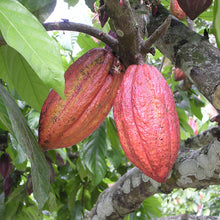
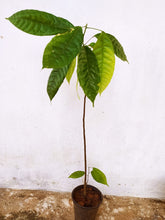
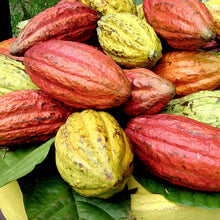
Cocoa/Cacao Fruit - Fruit Plants & Plantation crops




Damaged or lifeless? We’ll replace it for free. Learn more

Double layered custom boxes to protect plants during shipping.
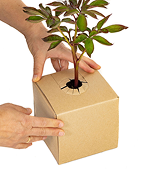
Air vents for proper air-flow
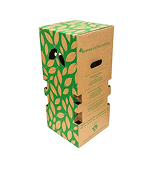
To preserve plant freshness during transit

Details steps of how to grow and maintain your plant
Cocoa botanically known as Theobroma cacao from Malvaceae family. Other common names are chocolate tree, cacao tree and it is a small evergreen tree can grow upto 4-8 meter in height. Leaves are alternate and 5–20 cm broad. The flowers are produced in clusters directly on the trunk and older branches(cauliflory). The flowers are small, 1–2 cm diameter, with pink calyx. The fruit of cacao pod is ovoid, 15–30 cm long and 8–10 cm wide, ripening yellow to orange and weighs about 500 gm when ripe. The pod contains 20 to 60 seeds, usually called "beans", embedded in a white pulp. The seeds are the main ingredient of chocolate. Its seeds, cocoa beans, are used to make chocolate liquor, cocoa solids, cocoa butter and chocolate.
Growing Tips
- It can be planted either in the beginning of South-West monsoon (May-June) or end of monsoon (September).
- Cacao need 50 percent of sunlight. It grows very well in the partially shaded condition prevailing in the arecanut and coconut gardens.
- Pruning in mature cocoa is necessary (diseased/unnecessary branches to shape the canopy in desired shape.
- Cocoa plants are sensitive to drought, irrigation in such cases are essential.
- Cocoa requires deep and well drained soils. Majority of area under Cocoa cultivation is on clay loam and sandy loam soil.
- It grows well in the pH range of 6.5 to 7.0.
- Cocoa requires 100 g N (220 g urea), 40 g P2O5 (200 g rock phosphate) and 140 g K2O (235 g muriate of potash) per year. One third of the fertilizer is applied in May - June and two third during September-October.
TEMPERATURE - Between 15°-35°C with optimum of 25°C.
MAXIMUM HEIGHT - It can reach upto 4-8 meter(if planted in the ground)
BLOOMING YEAR - It gives two main crops in a year i.e.,September-January and April-June.
FRUITING TIME - Cacao starts flowering after 2 years of planting.
Fertilizer - Organic Fertilizer twice in a year.
INSIDE THE BOX
| S.No. | PRODUCT NAME | DIMENSION |
| 1. | Cocoa Plant | 1-2 Feet Height |
| 2. | Growing Pot (Black color) | 6 Inch |
**above specifications are for indicative purpose only, actual dimensions may slightly vary.
INITIAL CARE FOR 10-15 DAYS JUST AFTER RECEIVING YOUR PLANT
- Remove the Packaging Materials carefully.
- Press the soil in the pot & add additional soil(garden mix) if necessary.
- Maintain moisture in the pot, Do not over water it may kill your plant, so make sure that the soil should be dry between watering.
- Make sure that plants get enough morning direct bright light(2-3hrs) for 10-15 days & do not go for immediate transplanting (minimum 1 month)
- After 1 month you can transplant it into slightly bigger pot than the present pot or directly in the ground.
- Just prune if any branch of the plant is get damaged in transits. New leaves will come definitely.
Selected plant of 8-10 inches
Planted into a 5-inch pot
With healthy, moisture-retaining soil
A care instruction sheet for maintenance guide

Get in touch for best pricing on bulk orders and landscaping projects.
 WhatsApp us
WhatsApp us

Call on 9177805454 (Mon-Sat, 9 AM-6 PM) or WhatsApp us – we’re here to help.
About Exotic Flora
At Exotic Flora, we’re passionate about bridging the gap in bringing plants to everyone. With over 500+ varieties across 7 plant categories, from exotic finds to everyday greens, we bring the entire range to you.
Our plants, sourced from all parts of India are nurtured at Kadiyam, in our 25 acres in-house nursery by a team of expert horticulturists. Once they are ready we ship all our plant varieties across India.
Our services go beyond safe delivery of plants. A dedicated support team is there to help you with any maintenance queries you may have.
At Exotic Flora we always believe in going that extra mile, because everyone should have the plants they love.
Every, fruit plants vary in their fruiting time, depends on location, climate & age of the plants. Generally, Grafted fruit plants starts fruiting within 2 years of planting, where as non-grafted plants take more than 2 years. You can check the fruiting time of each plant in the plant description.
No, Majority of fruit plants are not delivered with fruits. But some grafted fruit plants can be delivered with fruits and flowers mostly Citrus, Guava, Star fruit, Fig, Ber etc. But it is recommended to remove the flowers during early days, so that plants can get more branches and physical strength.
Grafting is a technique where two plants part are combined together so that they can grow together. Most commonly seen in Mango. Air Layering is also a vegetative propagation technique where a plant is produced while it is still attached to its parent's plants. Commonly seen in Guava. Stem cutting is a vegetative propagation technique, where soft, semi-hard, or hardwood stem is cut with 2-3 nodes and used for the multiplication of plants. Commonly seen in flowering & ornamental plants.
Yes, the grafted fruit trees produce fruit earlier, than the non-grafted fruit plants.
These are some of the rare and new fruit plants and it's varities, which are not avialable everywhere in our country.
Remove the plant from its pot. Make sure to not disturb the root ball. Place the plant in a prepared pit(1x1ft) or slightly bigger pot than the current pot. Firm the soil around the plant with your hands. Water well till it drains out from the drainage hole.
In order to maintain the good shape of the plants, proper care should be taken from the beginning like the pruning of unwanted and diseased parts of plants, stalking to young plants, regular maintenance of plants.
In General, a grafted/air layered/hybrid fruit takes 2 years for fruiting, whereas seeded grown plants take 4-5 years of time for fruiting. But it may vary depending on the plant types.
In general if your soil weell drained, fertile and organic in nature, it will produce good quality fruit. Sandy-loamy is the most preferable soil used for fruit plants.
Size and taste of each fruit plants varies depending on the varieties. You can find more details about each fruit plants in terms of size and taste in the description of individual plants.
Initial first 2 years are very important to feed the plants with organic manure and fertilizers regularly. It is recommended to add organic manure or compost to each plant in every 3 months of time intervals. Do not go for Chemical fertilizers it will weaken the plants in future.
Plastic pots with drainage holes preferably work best as they are lighter to move around. Any other container which is light in weight with a drainage hole can also work to grow fruit plants.
I received good plant, peckaging was good